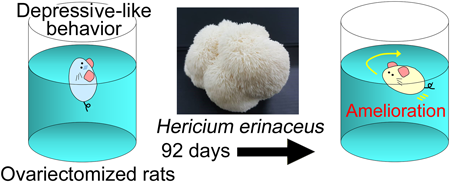- 著者
- 金澤 宏明 カナザワ ヒロアキ Hiroaki Kanazawa
- 出版者
- 立教大学アメリカ研究所
- 雑誌
- 立教アメリカン・スタディーズ = Rikkyo American Studies (ISSN:13464825)
- 巻号頁・発行日
- no.37, pp.81-101, 2015-03
- 著者
- Azliza Mad Anuar Akira Minami Hiroshi Matsushita Kanako Ogino Kosei Fujita Hatsune Nakao Shota Kimura Vikineswary Sabaratnam Kaoru Umehara Yuuki Kurebayashi Tadanobu Takahashi Hiroaki Kanazawa Akihiko Wakatsuki Takashi Suzuki Hideyuki Takeuchi
- 出版者
- The Pharmaceutical Society of Japan
- 雑誌
- Biological and Pharmaceutical Bulletin (ISSN:09186158)
- 巻号頁・発行日
- vol.45, no.10, pp.1438-1443, 2022-10-01 (Released:2022-10-01)
- 参考文献数
- 59
Estrogen deficiency during menopause causes a variety of neurological symptoms, including depression. The edible Lion’s Mane mushroom, Hericium erinaceus (Bull.: Fr.) Pers. (HE), is a medicinal mushroom that has the potential for a neuroprotective effect and ameliorating neurological diseases, such as depression, anxiety, and neurodegenerative diseases. HE contains phytoestrogens, including daidzein and genistein. However, the ameliorating effect of HE on menopausal symptoms is not well understood. Here we investigated the impact of methanol extract of the HE fruiting body on depressive-like behavior in postmenopausal model rats. The activation of estrogen receptor alpha (ERα) causes body weight loss and uterine weight gain. Body weight gain and uterine weight loss by estrogen deficiency in ovariectomized (OVX) rats were reversed with 17β-estradiol (E2) but not with HE. Thus, the phytoestrogens in HE may hardly activate ERα. Estrogen receptor beta (ERβ) is expressed in the brain, and activation of ERβ ameliorates menopausal depressive symptoms. Notably, depressive-like behavior in OVX rats evaluated in forced swim test was reduced by administration of not only E2 but also HE for 92 d. Long-term activation of ERα increases the risk of breast and uterine cancers. HE, therefore, may be effective in treating menopausal depression without the risk of carcinogenesis caused by ERα activation.
